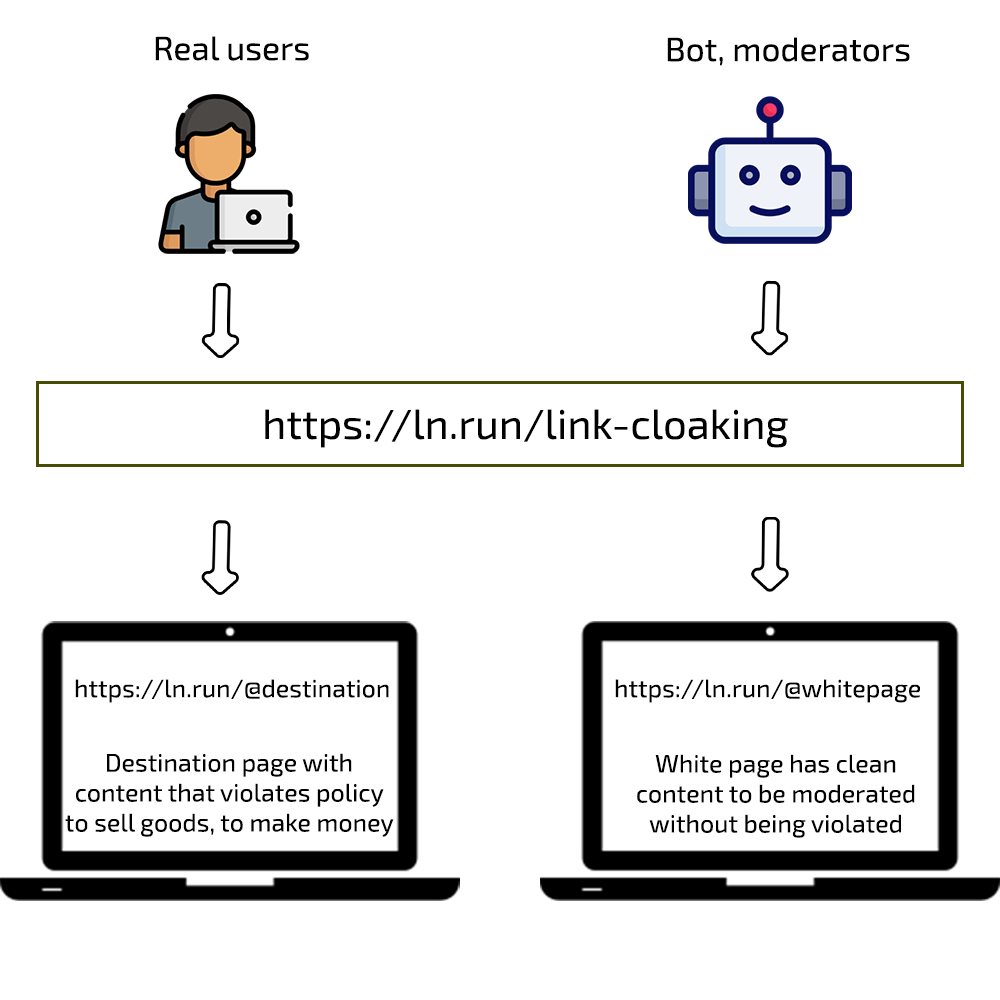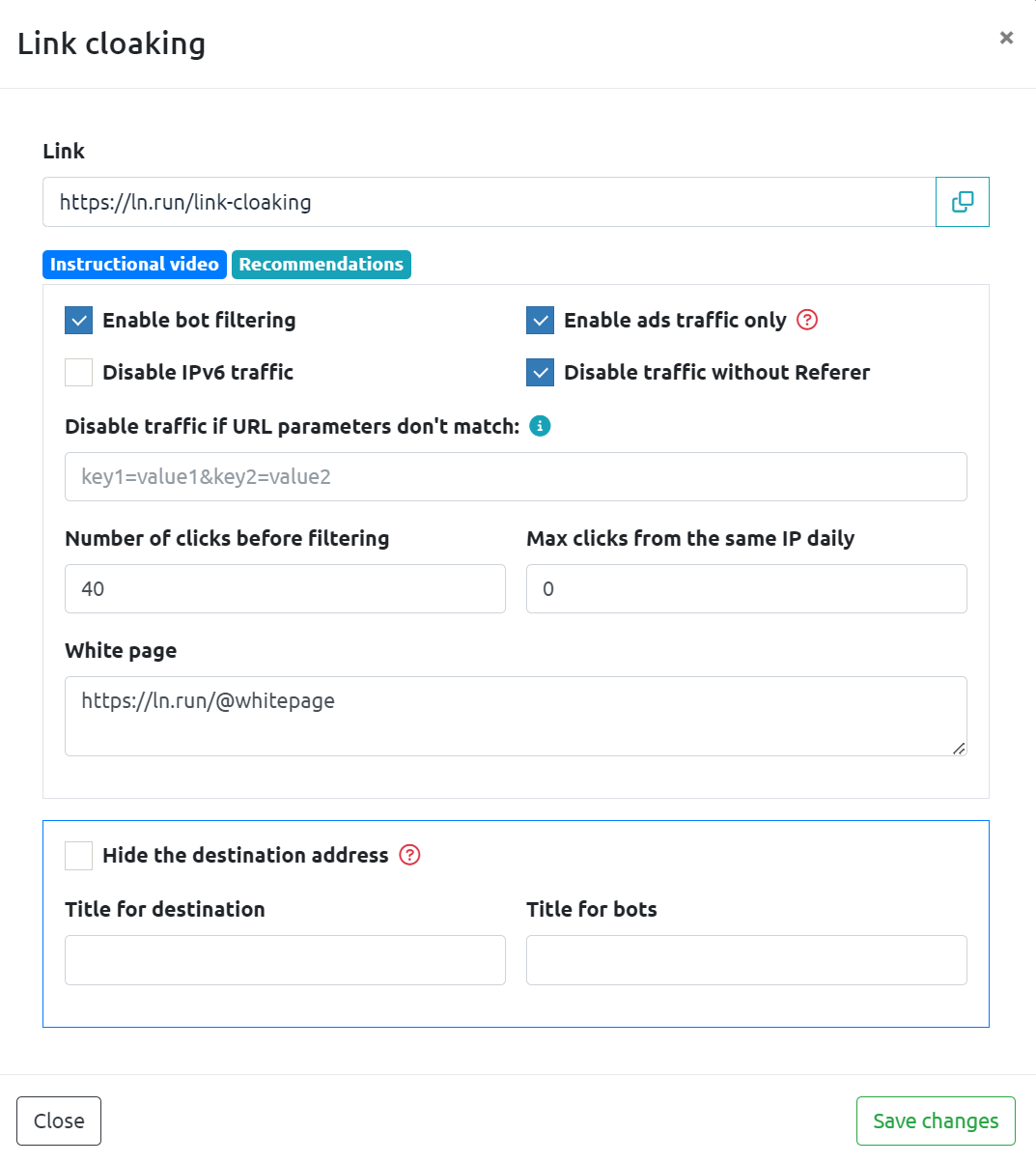The topic of link cloaking often gets tangled up in confusion. While the term "cloaking" might sound shady, it's actually a common and beneficial technique used in the realm of online marketing. So, what exactly is link cloaking? What is its significance, and how does link cloaking work? Let's explore all of this in this article.
What is link cloaking?
If you're wondering what link cloaking is, don't skip this section!

Link cloaking, also known as link masking, URL masking, URL cloaking, or link disguising, involves the process of concealing a user's intended destination displayed in the web browser's address bar. Instead, it displays the current landing page within an iFrame.
This practice proves particularly valuable in the realm of affiliate marketing, where the objective is to shield the user from viewing an affiliate URL.
You have the option to merge link cloaking with a vanity URL, allowing the use of any desired URL for the concealed page. This includes the utilization of your very own domain through ShortenWorld. ShortenWorld serves as both a link shortener and a link cloaker.
This approach empowers you to present users with attractive links, rather than affiliate links. As a result, trust, brand recognition, and most importantly, the click-through rate, all experience a significant boost.
Understanding Link Cloaking: Techniques, Benefits, and Applications in Internet Marketing
Link Cloaking is a technique used in internet marketing and website management to hide the actual destination URL of a link by providing a different, more user-friendly URL. This is often done for several reasons, including:
Affiliate Marketing: In affiliate marketing, marketers use links to promote products or services. These links can be long, complex, and may include parameters for tracking affiliate commissions. Link cloaking helps make these links more attractive and less intimidating for users.
Aesthetics: Long and complex URLs can be unattractive and may detract from the overall appearance of a website or marketing material. Link cloaking creates shortened links that allow for a clearer and more appealing presentation.
Branding: Link cloaking can enable you to use your own domain name in the link, enhancing your brand's presence and credibility.
Tracking: Link cloaking can also be used to monitor click-through rates and other analytics related to the link.
In some cases, link cloaking is used for running advertisements. Sometimes, when a website is banned from advertising on platforms like Google, Facebook or TikTok... this technique is used to bypass the system (advertising circumvention).
Why Link Cloaking Matters?
Link cloaking operates much like the process of link shortening. In fact, it's often the case that when you cloak a link, you also make it shorter, although this isn't obligatory.
The primary focus of link cloaking revolves around establishing a distinct identity for your URLs and safeguarding any sensitive details they may encompass. Consider this illustration of a long link that has undergone cloaking:

Original: example.com/?clickid=abcds12345
Cloaked: yourwebsite.com/product-name
The difference might seem subtle, yet it wields a significant impact. While link cloaking proves valuable across various scenarios, its potency truly shines in the realm of affiliate marketing. Employing this strategy, you're able to obscure your affiliate IDs and seamlessly incorporate your brand name into your linking approach.
The act of concealing your affiliate IDs becomes imperative when substantial sales are at play. As you're likely aware, the landscape of affiliate marketing is fiercely competitive. Instances of malware infiltrating visitors' devices to detect and replace affiliate ID-laden links have been reported.
This malicious maneuver allows bad actors to snatch your commissions without detection. Affiliate link cloaking disrupts such assaults by veiling your affiliate IDs.
Lastly, a common misconception suggests that link cloaking adversely affects your search engine optimization (SEO) efforts. Fortunately, this notion has been consistently dispelled by SEO experts. For those engaged in affiliate marketing, there exists no valid rationale against adopting link cloaking practices.
5 Reasons Every Affiliate Marketer Must Implement Link Cloaking
Using a link cloaking solution such as ShortenWorld offers several key benefits:
- Boost Click-Through Rates: As mentioned earlier, an affiliate link often appears unattractive and lacks user-friendliness. In today's digital landscape, users hesitate to click on links that appear untrustworthy. By shortening links through link cloaking, you can increase click-through rates and subsequently enhance your commission potential.
- Memorability and Manageability: Imagine how many people would remember an original affiliate link with a string of numbers and characters? Certainly not many. However, after shortening links using various tools, you'll find it easy to recall links for different products.
For instance, when promoting hosting services, you can create user-friendly shortened links like http://domain/hosting, and simply add the product path as a suffix, such as /product. Isn't that incredibly easy to remember and manage? - Simplified Analytics: Through URL masking, tracking clicks becomes effortless. You'll be able to easily analyze how many clicks your links receive, which articles on your website/blog attract the most clicks, and more. This enables you to assess, modify, and improve your content to reach a wider audience, generate more clicks, and ultimately earn higher commissions.
- Increase the Rate of Emails Sent to the Inbox: One of the advantages of link cloaking in affiliate marketing is that it significantly reduces the chances of your emails landing in spam folders. Spam filters tend to dislike affiliate links. By shortening and embedding these links in your email content, you drastically enhance the likelihood of your emails directly reaching the inbox!
- Incorporating Retargeting/Remarketing: You can affix retargeting and remarketing tags to cloaked pages, which facilitates displaying advertisements to users who haven't yet converted.
Techniques for Cloaking Links in Policy Violation Advertising
Link cloaking techniques are often implemented using URL redirection methods. Instead of displaying the actual destination URL, another, more user-friendly URL is shown. When users click on the cloaked link, they are automatically redirected to the actual destination URL.
However, it is essential to use URL cloaking techniques responsibly and ethically. Some people misuse this technique for malicious purposes, such as hiding phishing URLs or spreading malware. In such cases, link cloaking can be associated with deceptive behavior and may violate the terms of service on certain platforms. Therefore, it is crucial to use URL cloaking for legitimate and ethical purposes, such as enhancing user experience or managing affiliate marketing links.
Cloaking Links for Policy Violation Advertising
Link cloaking is used to redirect real user traffic to a monetized page, while bot or reviewer traffic is redirected to a clean page:
- When a bot or reviewer clicks on the cloaked link, they are redirected to a clean page, one that complies with all advertising policies and does not violate any regulations.
- When a real user clicks on that cloaked link, they are redirected to another page, which is the desired destination the advertiser intends to show to users.
Link cloaking with Shorten World allows you to run ads on various platforms such as Google, Facebook, TikTok, Zalo, etc., without worrying about policy violations. Additionally, the system has many special features that help track traffic, real user click rates, bot rates, and more. You can find detailed instructions on how to cloak links here.
How to cloak affiliate links for free?
Currently, Shortenworld stands as one of the leading free link cloaking tools. Here, you not only gain the capability to create a considerable number of free shorten links but also unlock the capability to cloak affiliate links.
This is a relatively new tool compared to Bitly or Linkly; however, it's incredibly powerful and easy to use. For more enhanced features, you can explore Shortenworld's paid version.
Have you employed the link cloaking technique in your affiliate marketing yet? How do you perceive its significance? Give this feature on ShortenWorld.com a try!
Frequently Asked Questions About Link Cloaking (FAQ)
Why do people use link cloaking techniques?
Link cloaking is used for various reasons, including making links more attractive, enhancing the aesthetics of a website, strengthening branding, and tracking click-through rates as well as other link-related analytics.
How is link cloaking different from link shortening?
Link cloaking is essentially a feature of link shortening. Link shortening converts a long URL into a shorter one, whereas link cloaking uses the shortened link to hide the target page behind it. Thus, link cloaking is performed after creating a shortened link.
Is link cloaking ethical?
Link cloaking can be ethical when used for legitimate purposes such as improving user experience or managing affiliate marketing links. However, it can be misused for deceptive, unethical, or potentially illegal activities.
How does link cloaking work?
Link cloaking typically involves using URL redirection techniques. When a user clicks on the cloaked link, they are automatically redirected to the actual destination URL.
What are some common applications of link cloaking?
Link cloaking is commonly used in affiliate marketing to make links more user-friendly. It is also used to present cleaner, more appealing URLs, enhance branding, and track link performance.
Are there any risks associated with link cloaking?
Yes, there are risks if link cloaking is used for malicious purposes, such as hiding phishing URLs or spreading malware. It may also violate the terms of service of certain platforms if misused.
What tools or services can I use for link cloaking?
Several online services and link management tools offer link cloaking and tracking capabilities, including ShortenWorld, Ln.run, and Shorter.me.
Do search engines like Google penalize link cloaking?
Search engines are generally not favorable toward deceptive practices involving link cloaking. If it is used for unethical purposes or to manipulate search engine rankings, it could result in penalties in search results.
Can link cloaking impact SEO (Search Engine Optimization)?
Link cloaking itself does not necessarily impact SEO, but its usage can. If used to create spam or deceptive content, it can negatively affect SEO.
How can I ensure I am using link cloaking responsibly?
To use link cloaking responsibly, make sure it aligns with ethical and legal standards and serves legitimate purposes, such as improving user experience without deceiving users.
Are there alternatives to link cloaking?
Yes, alternatives include using descriptive anchor text or link shortening through reputable services, which can achieve some of the same goals without full link cloaking.
What is the best tool for link cloaking?
ShortenWorld is renowned as a top tool for link cloaking due to its reliability, robust security measures, and comprehensive link management toolkit. Beyond basic link cloaking, ShortenWorld offers advanced features such as click-through rate analytics, URL branding, traffic tracking, IPV6 cloaking, referral cloaking, and non-advertiser traffic filtering.
Remember, using link cloaking ethically is crucial and should be approached with transparency and user trust in mind.